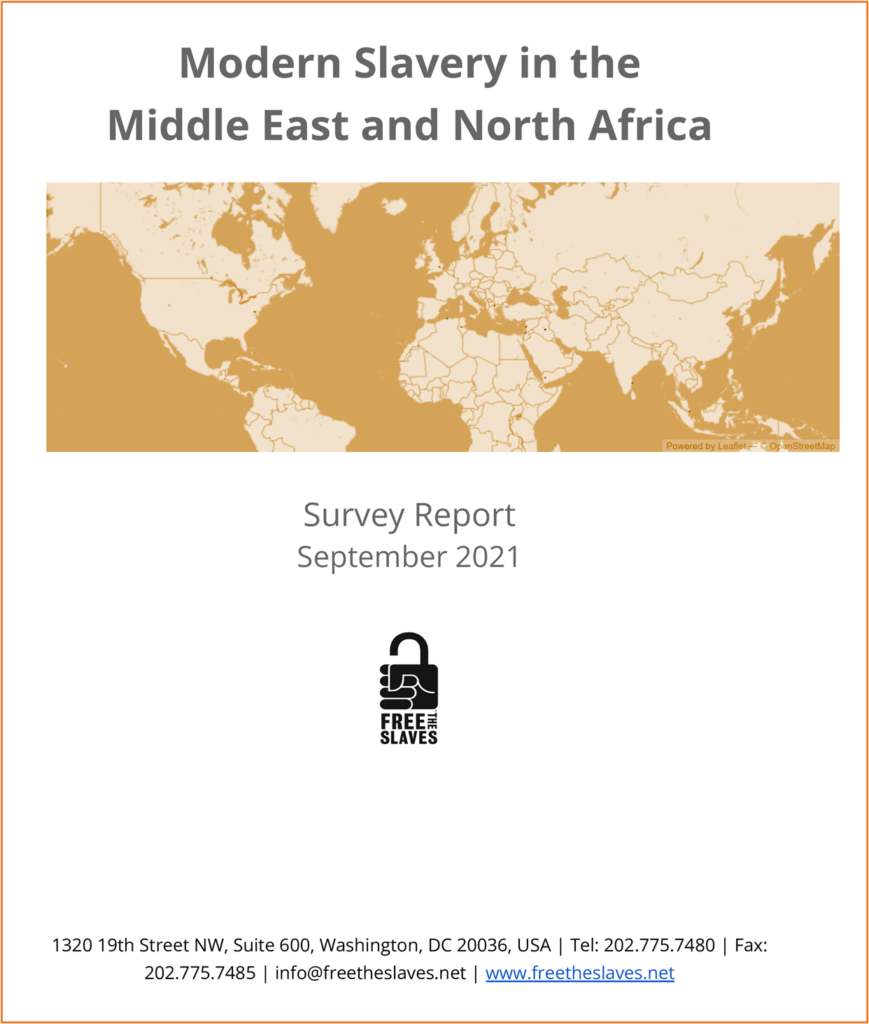Women, children, migrants, refugees, and other minorities are especially vulnerable to human rights violations in the Middle East and North Africa (MENA).
This vulnerability is magnified by a wide range of factors, including economic instability, conflict, climate change, corruption, inequality, and systemic discrimination. Hundreds of thousands of persons are in conditions of modern slavery and human trafficking (MSHT) in the region and are exploited in construction sites, entertainment bars, and households. The covid-19 pandemic has further exacerbated vulnerability to exploitation through debilitated socioeconomic conditions and mobility restrictions, potentially increasing the number of persons in modern slavery.
Free the Slaves recognizes the urgent need to protect the most vulnerable and eradicate MSHT in MENA. However, the lack of consensus surrounding terminologies and limited data on the subject, coupled with structural factors, prove difficult to address the issue effectively. As part of our regional strategy, we launched a survey to better understand the anti-modern slavery landscape of the region. The research focused on four dimensions that enhanced our understanding of the:
- organizational and geographical profiles of civil society organizations,
- diverse conceptualizations of modern slavery,
- existing capacities to address MSHT, and
- interest in comprehensive approaches through prevention, protection, prosecution, and partnerships.
The responses resulted in a number of findings, among them:
- Women, children, migrant workers, and refugees are the focus populations of programs, especially in Jordan, Lebanon, Tunisia, Iraq, Yemen, Oman, UAE, and Kuwait, while the needs of those who are most marginalized and susceptible to modern slavery, such as the elderly, religious minorities, racial or ethnic minorities, and LGBTQ+ populations, are not being addressed to the same degree,
- The most prevalent form of modern slavery, according to civil society representatives, is labor trafficking, while sex trafficking, organ trafficking, forced labor, child labor, domestic servitude, and forced marriage are considered as the second most prevalent forms,
- Diverse terminologies and definitions on MSHT are used,
- Civil society actors possess diverse levels of understanding regarding existing anti-modern slavery instruments at the international and regional levels, which are likely to inform how they understand and approach the issue,
- Knowledge of regional and international anti-modern slavery movements, such as Alliance 8.7, is limited, and
- Capacity building, advocacy, and research constitute key programmatic areas of organizational initiatives despite the reality that a large number of organizations have not been trained on anti-modern slavery.
These findings provide us with a clearer understanding of existing gaps and the ways that these can be narrowed for transformative change. They point to the need to further build the capacities of civil society organizations, mainstream the language surrounding MSHT, explore how an understanding of various instruments inform organizational approaches to the issue, engage in increased advocacy surrounding regional and international movements and how civil society actors can capitalize on these, and invest in continued research, especially of a qualitative nature.
Going forward, the realizations that emerged from the study will help us continue to explore strategic solutions to end modern slavery through increased research, partnerships, training and capacity building, and advocacy efforts while driving the anti-modern slavery movement at the regional level.
To learn more about the study, please see the full report.
Nour Sibaai is the Free the Slaves Middle East and North Africa Regional Manager
Lianet Rosado is the Free the Slaves Senior Programs Associate




